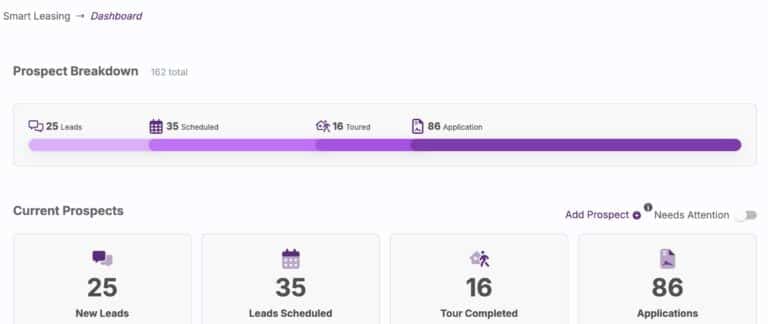How to Use Artificial Intelligence (AI) to Ensure Multifamily Success
A common narrative around artificial intelligence is that it will lead to mass unemployment as robots take over, but this is a myth about AI and is far from reality.
Instead, experts believe AI will cause a shift in job duties as humans delegate some tasks to AI, ultimately resulting in new industries that will create more jobs than are lost to the technology.
For Multifamily, this shift means that leasing agents and property managers would be spending less time on repetitive, monotonous tasks like answering phones and more time on work that’s more satisfying. It might even change the role of the leasing agent altogether.
In this post, we will take a look at how AI can make work more meaningful for apartment professionals going forward, how it may affect prospects’ leasing experiences, and how it can contribute to a healthy bottom line for communities.
How is AI changing the role of the leasing agent?
A big part of a leasing agent’s job is replying to emails as well as answering and returning phone calls. When those tasks are handled by AI, leasing agents can concentrate on more strategic, rewarding, and value-creating duties around the leasing process, in tandem with their bot colleagues. This will help reduce lead response time, lead to lease time, and increase lead to tour rates.
Reviewing transcripts of conversations.
An AI leasing agent is not a “set it and forget it” type of technology. Thanks to natural language processing, AI bots are continually learning and becoming more efficient, but they need to be monitored to ensure things are going smoothly. In a sense, leasing agents become the supervisors of the bots. By reviewing transcripts of the chat conversations between the AI leasing agent and prospects, human leasing agents can identify areas for improvement to ensure communities are getting the most out of this technology.
Gaining insights into how likely a prospect is to sign a lease.
Leasing agents aren’t psychics, but they tend to know the signals for when a prospect will most likely sign a lease and when they won’t. For instance, prospects that reach out during the workday are more motivated to lease, and prospects that don’t include their phone number are probably not that serious yet about leasing. Leasing agents can categorize and prioritize prospects based on this data collected by the AI leasing agent.
Problem-solving becomes more prevalent
AI leasing agents are certainly helpful, but they can’t match human intelligence and creativity. Human leasing agents need to be available to step in if the bot gets stuck, and their time is also freed up to address any other issues that pop up in the community as well since AI will be handling the most rote tasks. In fact, the role profile of an apartment leasing agent could be expanded to encompass property management tasks and other responsibilities that require a human touch.
How is AI helping prospects?
A prospect expects to hear back quickly when they leave a voice mail or send an email, and AI makes that possible. Searching for a new place to live is stressful, and the community that makes the process a bit easier will have an advantage over the competition.
A better user experience
A quick, easy leasing process is what all renters want, and AI has the power to make that happen. An AI leasing agent can read and respond to messages within minutes of receiving them, whereas humans might take hours or days to reply to an email from a prospect. Multifamily is competitive, and the community that can give prospects a seamless experience has an edge.
It’s meeting prospects where they are
A huge portion of today’s renters is Millennials and Gen Z, who have been raised with technology and embrace it. They’re more likely to consider interacting with AI as a normal activity and some might even prefer it to human interaction.
COVID-19 made AI customer service agents commonplace
Companies across the board brought in AI help during 2020 and beyond, so people expect it. In fact, sometime soon we’re expected to reach a tipping point where most customer service interactions are handled by AI.
How is AI benefitting a community’s bottom line?
Not only are leasing agents’ roles changing as a result of AI, leasing office operations are, too. An AI leasing agent is capable of having simultaneous chats with multiple users, creating efficiency that humans simply cannot match. Here are more ways that AI can play a significant role in ensuring a community’s success:
No prospects “falling between the cracks.”
It’s easy to get overwhelmed with returning prospects’ calls and emails upon returning to work after a long weekend, and inevitably, some prospects will receive no follow-up. However, that doesn’t happen with an AI leasing agent. It answers all messages and calls, and even handles the follow-up conversations until the prospect completes a rental application.
Responses are consistent.
It’s frustrating when a prospect receives different answers to their questions depending on who they ask. An AI leasing agent provides the same information to every prospect, staying true to Fair Housing rules and keeping your community’s messaging streamlined.
Shorter lead-to-lease time.
In order for a community to remain financially healthy, it needs to be at or close to maximum capacity most of the time. Time is money, and so getting a prospect into an apartment quickly is important, and doing so is much easier with AI. An AI leasing agent can accelerate the leasing process by responding immediately, following up, and nurturing the lead in less time than it would take a human leasing agent.
Conclusion
AI will continue to drive massive shifts in Multifamily, continuing a process that was jump-started by the pandemic. Adding AI to the apartment leasing process is a win for all stakeholders—leasing agents, prospects, and management. This technology will keep disrupting apartment leasing and shifting the process in ways we can’t even predict just yet. Reach out to learn more about all of the products with Respage’s AI Leasing Suite.






